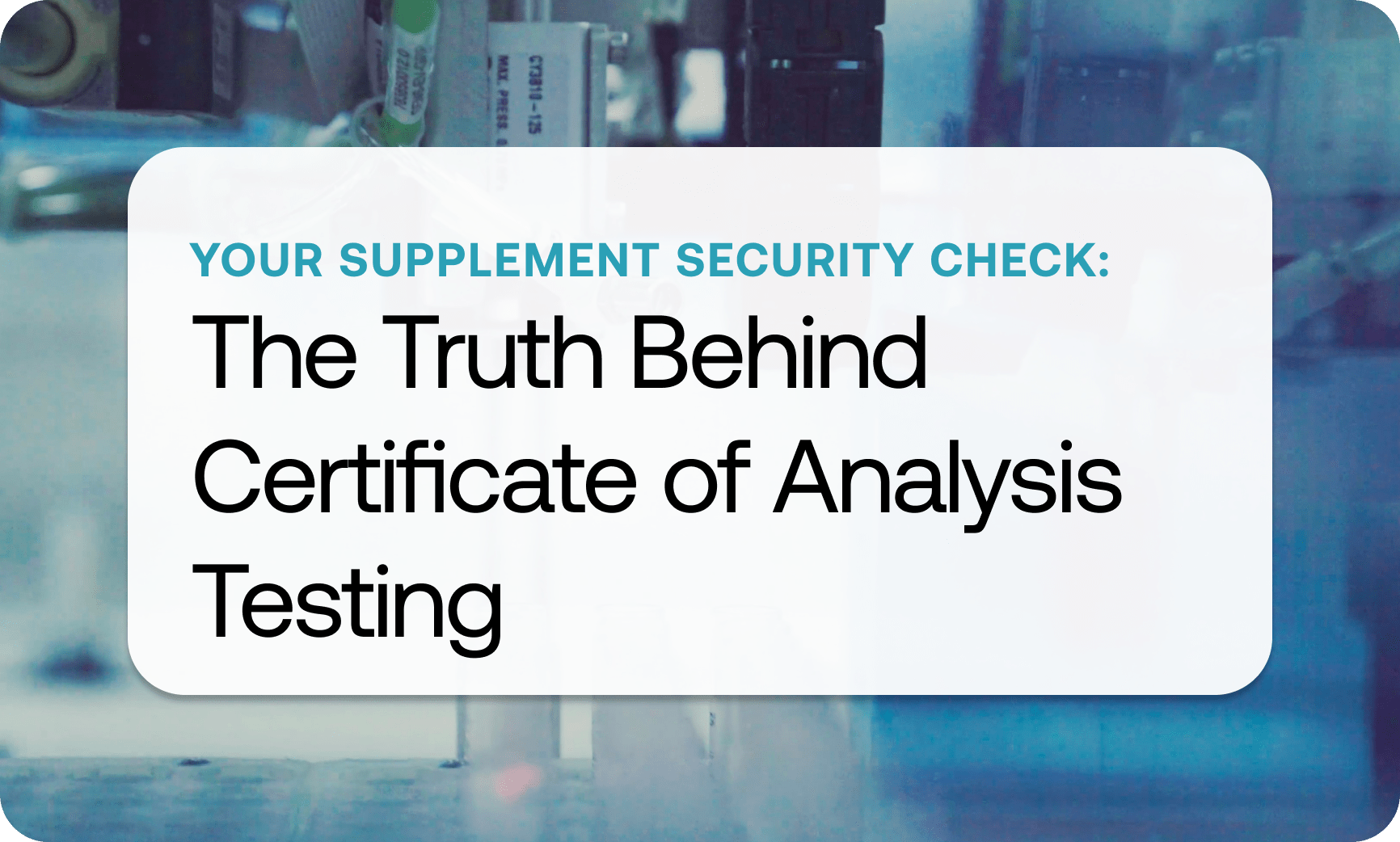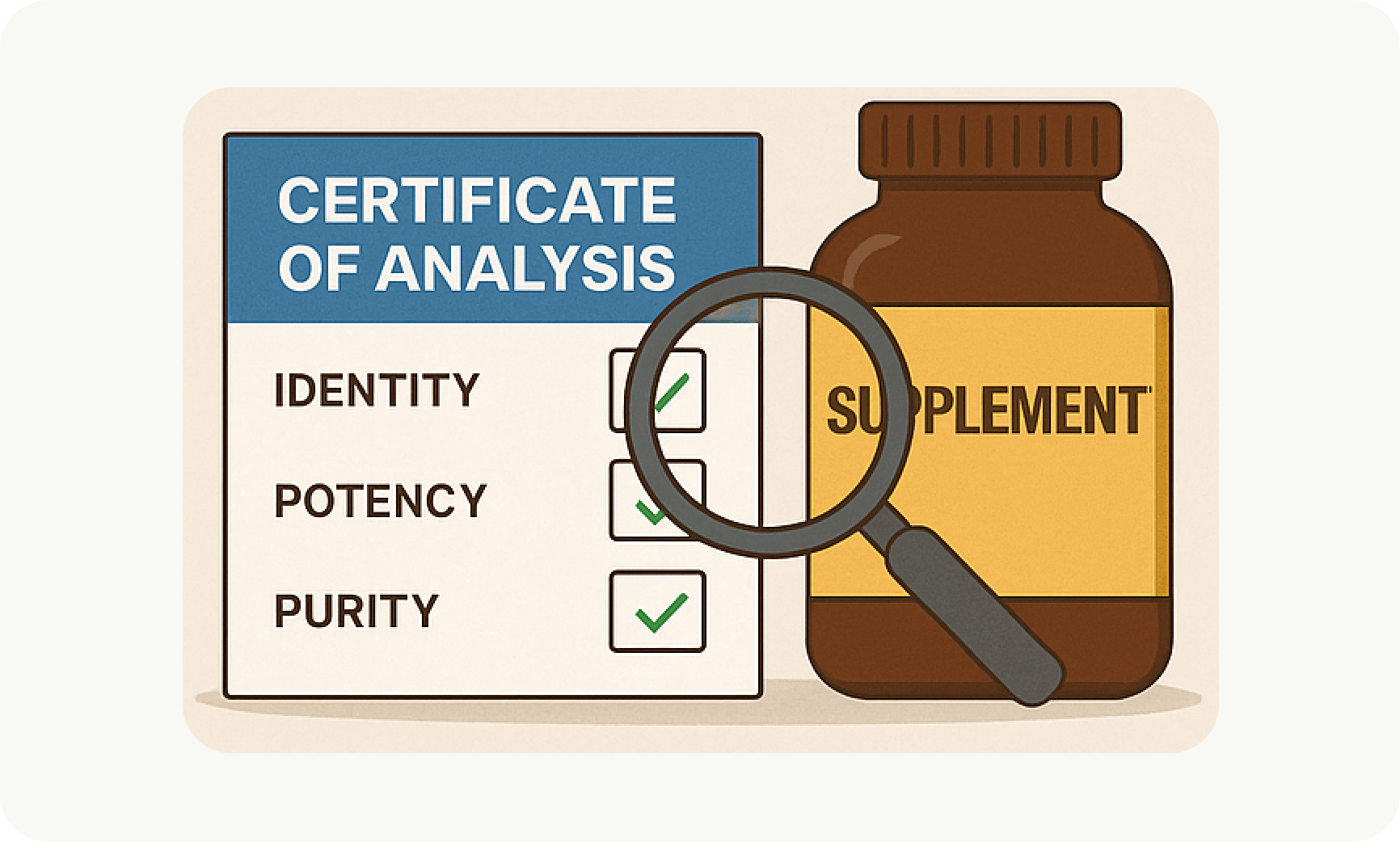Science Corner 08 | The Truth Behind Certificate of Analysis Testing

When I joined the SuppCo team, one thing immediately stood out—our unwavering commitment to transparency in an industry where marketing claims often overshadow substance. Our path to evaluating a product’s TrustScore includes validating rigorous testing, with Certificate of Analysis (COA) testing leading the charge.
What's a Certificate of Analysis, Really?

Think of a COA as your supplement's honest report card—scientific documentation verifying that what's in your bottle actually matches what's on the label. It's not marketing speak; it is scientific validation created by a laboratory that thoroughly examines:
Identity confirmation (Is the claimed ingredient actually present?)
Potency verification (Are the active ingredients at the promised levels?)
Purity assessment (Is the product free from harmful contaminants?)
The difference? Taking someone's word versus seeing the proof with your own eyes. You deserve the latter.
The Behind-the-Scenes Journey
Creating a legitimate COA isn't a checkbox exercise—it's a meticulous process where each supplement batch undergoes comprehensive testing before reaching you.
In a perfect world, product samples head to third-party laboratories, independent experts with no financial stake in the results. These labs employ advanced analytical techniques like high-performance liquid chromatography and mass spectrometry to reveal the unfiltered truth about your supplements.
Only products passing these rigorous tests earn their certificate and make it to market. And while this is not industry standard, it is the gold standard.
The COA Quality Spectrum
Not all certificates deliver equal confidence. Many manufacturers produce internal COAs that merely confirm raw ingredient identity and perform basic screening. While better than nothing, these limited reports rarely offer complete transparency.
The truest measure of quality comes from independent, third-party COAs conducted by labs with zero financial interest in the outcome. Premium COAs go deeper, providing:
Advanced identity testing using validated scientific methods
Precise active compound measurements
Comprehensive screening for contaminants including microbials, heavy metals, and pesticides
Batch-specific documentation tied to your specific product lot
Testing through ISO/IEC 17025 certified labs, an internationally recognized mark of technical competence ( In-house labs at manufacturers specifically certified to the ISO 17025:2017 standard also provide excellent COAs)
For excellent examples of transparency in action, look to companies like Transparent Labs, IM8, and Beam, brands that make their COAs publicly accessible, demonstrating their commitment to doing supplement testing the right way.
Why This Matters to Your Health Journey
I remember a pivotal conversation with our team that captures our philosophy perfectly: "If we're asking people to put something in their bodies, shouldn't we be absolutely certain of what that something is?"
This isn't just about checking regulatory boxes—it's about genuine care. While the FDA regulates supplements, the requirements aren't as stringent as pharmaceutical standards. This creates a gap that responsible companies must fill themselves.
At SuppCo, we've chosen to fill that gap with science and transparency. Every TrustScore evaluates whether companies have third-party testing for their products, and we reward those doing the work.
This is not an industry standard—it's the SuppCo standard.
What This Means For You
When choosing supplements backed by third-party testing, you're making an informed decision about your health. You're actively rejecting mystery ingredients, inaccurate dosages, potential contaminants, and empty marketing claims. Instead, you're embracing a wellness path built on verification.
A third-party COA represents just the beginning of TrustScore’s commitment to your wellbeing. We see these certificates as part of a broader promise that includes research-backed claims, ethical manufacturing, and ongoing education.
Your health journey is uniquely yours and deserves nothing less than complete truth. That's the SuppCo standard—that's our promise to you.
--
A personal note from Jordan
You check food labels before eating—I know you do. We scan for sugar content, inspect those ingredients we can't pronounce, and make choices accordingly. Yet somehow, with supplements, many of us skip this crucial step. For me, COAs are simply a way to confirm what’s on the label. If I wouldn't put mystery ingredients in my shopping cart, why would I put them in my body? Let's bring that same label-reading superpower to our supplement shelf.
To health without guesswork,
Jordan
